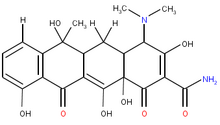Tetracycline
This article deals with the specific antibiotic called Tetracycline. For the group of antibiotics known as the Tetracyclines, see Category:Tetracycline_antibiotics. more...
Tetracycline is an antibiotic produced by the streptomyces bacterium, indicated for use against many bacterial infections. It is commonly used to treat acne. It is sold under the brand names Sumycin®; Tetracyn®; Tetralysal 300®, Panmycin®, Brodspec® and Tetracap®, among others. Actisite® is a thread-like fiber form, used in dental applications. It is also used to produce several semi-synthetic derivatives, which are known as the Tetracyclines.
History
Tetracycline was first discovered by Lloyd Conover in the research departments of Pfizer. The patent for Tetracycline was first issued in 1955 (patent number 2,699,054). Tetracycline sparked the development of many chemically altered antibiotics and in doing so has proved to be one of the most important discoveries made in the field of antibiotics.
Mechanism and resistance
Tetracycline inhibits cell growth by inhibiting translation. It binds to the 30S ribosomal subunit and prevents the amino-acyl tRNA from binding to the A site of the ribosome. The binding is reversible in nature.
Cells become resistant to tetracyline by at least two mechanisms: efflux and ribosomal protection. In efflux, a resistance gene encodes a membrane protein that actively pumps tetracycline out of the cell. This is the mechanism of action of the tetracycline resistance gene on the artificial plasmid pBR322. In ribosomal protection, a resistance gene encodes a protein which binds to the ribosome and prevents tetracycline from acting on the ribosome.
Contraindications
When ingested, it is usually recommended that tetracycline should be taken on an empty stomach with a full glass of water unless upset stomach becomes a problem (please ask your doctor). This is partly due to the fact that tetracycline binds easily with magnesium, aluminium, iron, and calcium, which reduces its ability to be completely absorbed by the body. Dairy products, preparations containing iron, or large amounts of sunlight are not recommended directly after taking the drug.
Tetracycline use should be avoided during pregnancy and in the very young (less than 6 years) because it will result in permanent staining of teeth causing an unsightly cosmetic result.
Tetracyclines also become dangerous past their expiration dates. While most prescription drugs lose potency after their expiration dates, tetracyclines are known to become toxic over time; expired tetracyclines can cause serious damage to the kidneys.
Read more at Wikipedia.org



